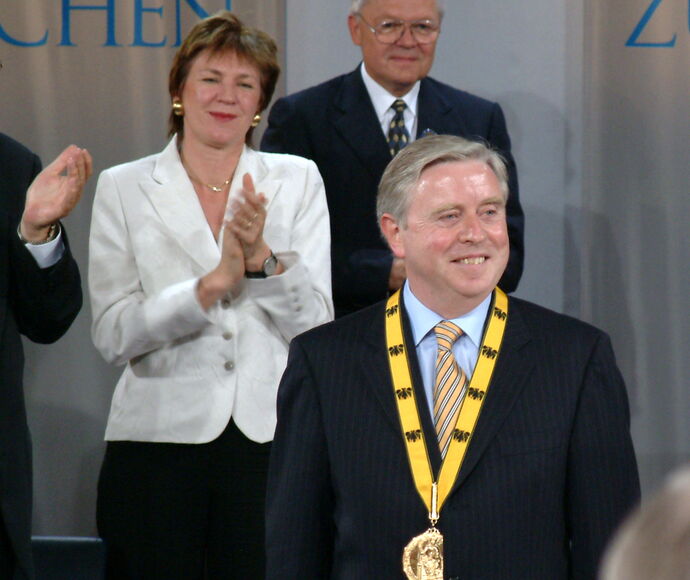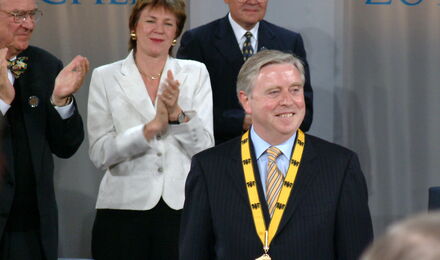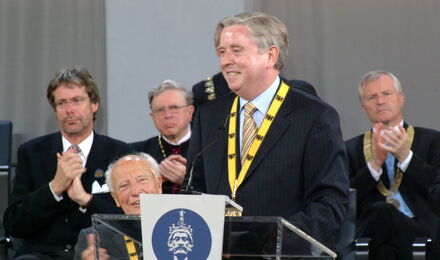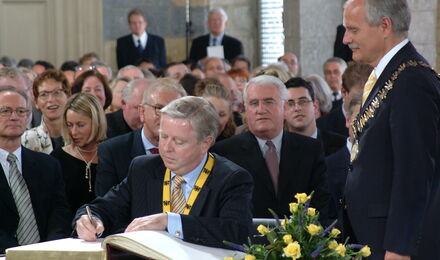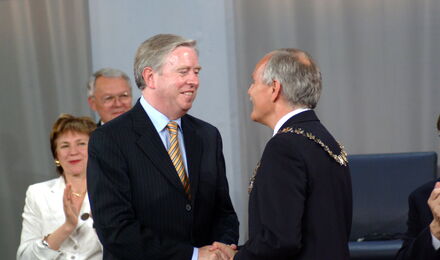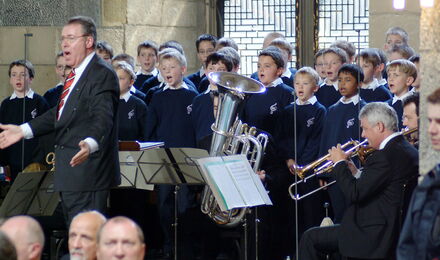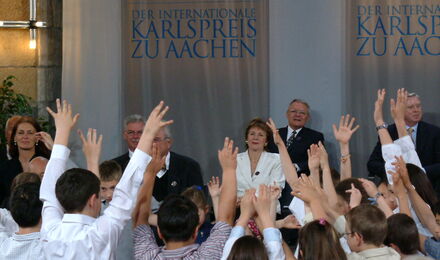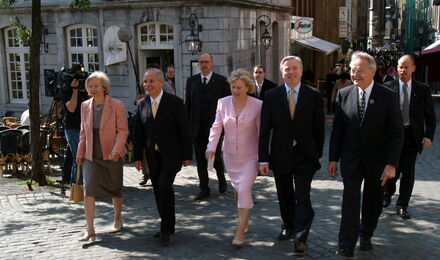Award of the International Charlemagne Prize of Aachen to the President of the European Parliament, Patrick Cox:
After the first hesitant steps in the 1950s, the European Union has come a long way in the past few decades: the community of six for coal and steel has become the union of fifteen, and ten more states are about to join. The former economic community has become a trading and world economic power and the single market with the greatest purchasing power in the world. And today, more than 300 million people, living well beyond the borders of the former customs union, pay with the same currency. However, the more important European policy has become for the lives of citizens, the more difficult it is for them to recognise clear competences and responsibilities – which is not infrequently accompanied by a lack of public acceptance. The Nice summit and the much-discussed post-Nice process have made it clear that changes in the quality of European policy are pending.
The concrete design of the economic and monetary union and, ultimately, the political union, the admission of new states to the community, the reform of the political system as part of a future European constitution and the renewal of the international role of the EU herald a new dimension of the integration process. In this decisive phase of the future shape of Europe, the institution of the Community has assumed the leading role – a fact that has been insufficiently recognised by the public – that has been drawing its legitimacy from the direct election by the population for around 25 years now: the European Parliament.
It was the European Parliament that set a timeframe for the completion of the first round of enlargement and, in particular, insisted that this should be done in time for the new member states to be able to take part in the next parliamentary elections in June 2004. And it was the European Parliament that, in October 2000, before the conclusion of the Treaty of Nice, adopted a report on the constitutionalisation of the European treaties and called for the establishment of a convention on the future of Europe.
If 2003 was the year of preparations for the enlargement and further deepening of the Union, 2004 will be the year of the European Parliament; a Parliament in which the enlargement of the Community must be implemented and experienced and on which hopes now rest for further deepening of integration; a Parliament that stands for the democratic identity of a united Europe and the overcoming of national self-interest; and a parliament that is already giving the 25-member Union a face through its members and the observers from the accession countries – from Portugal to Latvia and from Finland to Cyprus.
In appreciation of the leading role that the European Parliament has assumed in a decisive phase of the moulding of Europe's future, and in recognition of his outstanding personal services in the cause of the now imminent enlargement of the Union, the Board of Directors of the Society for the Conferring of the International Charlemagne Prize of Aachen honours the President of the European Parliament, Pat Cox, in the year 2004.
Patrick (Pat) Cox was born on 28 November 1952 in Dublin, where his father worked as a watchmaker. He later grew up in Limerick, attending St. Munchins CBS and Ard Scoil Ris there. He completed his studies in economics in Limerick in 1974 with a Bachelor of Arts degree. In addition to working as a lecturer in economics at the Institute of Public Administration in Dublin, he graduated in 1976 with a Master of Arts and took on a teaching post at his home university in Limerick until 1982. There he was one of the founders of the first Irish non-graduate programme in European Studies.
Between 1982 and 1986, he became nationally known as a television presenter of popular daily political programmes such as ‘Today Tonight’ on the RTÉ television station in Dublin, before moving into politics as Secretary General of the ‘Progressive Democrats’ party, which he co-founded.
Although he was first elected to the European Parliament in 1989, Irish politics initially remained his main focus. As late as the early 1990s, he was still serving as the Progressive Democrats' financial policy spokesperson in the House of Representatives. After falling out with his party, Cox was re-elected to the European Parliament as an independent candidate in 1994. The liberal faction, which he had joined in 1989, then elected him deputy chairman – a position in which he was able to exert considerable influence on the liberal party's strategy and policies. One year before the new parliamentary elections, his faction elected him as its chairman in 1998. When the EU Commission, chaired by Jacques Santer of Luxembourg, lost a great deal of trust shortly afterwards due to the misconduct of two of its members, the European Parliament, and in particular the liberal faction, played a more forceful role than had previously been the case. On behalf of the liberals, Pat Cox in particular repeatedly emphasised the individual responsibility of the commissioners to the European Parliament. The unusually fierce public and parliamentary debate finally led to the resignation of the entire Commission in March 1999 – for the first time in the history of the EU.
In the June 1999 elections, Cox, as an independent candidate once again, managed to defend his seat in Parliament. The third largest faction in the European Liberal, Democrat and Reform Party, with 51 members, then confirmed him in his office as their leader. On 15 January 2002, the married father of six children was finally elected President of the European Parliament, for whom he defined clear priorities for his term of office:
- The enlargement of the European Union.
- The strengthening of the role of the European Parliament and better and more mature cooperation with the other institutions, in order to create a more transparent legislative process for European citizens. The democratic element, represented by the European Parliament, should have a clear influence over bureaucratic procedures.
- The substantial contribution of the European Parliament to the convention.
An unmistakable sign that the representation of the people sees itself as a driving force in the enlargement process: Pat Cox set an unprecedented example in the first months of his presidency. For the first time, he invited 147 members of national parliaments from the ten most advanced candidate countries, along with guests from Bulgaria and Romania, to the plenary debate on enlargement in November 2002, and he gave an impressive description of how MEPs see themselves:
‘As parliamentarians, we are called upon to take a leading role in winning the approval of the public in the member states and in the candidate countries. No public advertising or information campaign can replace real politics based on conviction and reason. The time has come for politicians to take the enlargement agenda from the experts who have prepared the way. As parliamentarians, we are the ones who have direct contact with our constituencies. We know the hopes and fears of our citizens. We must take the enlargement agenda and communicate it to our citizens. We must also provide vision and exercise our leadership. We are the indispensable democratic interface between our constituencies, our regions, our countries and the European idea.’In order to prepare for the forthcoming round of enlargement, Mr Cox, in line with the role he had set himself, travelled to all the candidate countries during his first few months in office. The main purpose of his visits was to assure the political leadership and the people of the accession countries of the full support of the European Parliament during the difficult phase of preparing their referendums, and also to counter some of the scepticism in the West.
The President of the European Parliament also used the full weight of his office in a major campaign to persuade his fellow countrymen to vote ‘Yes’ in the Irish referendum on the Treaty of Nice. He was the only Irish politician to tour his country for several weeks in a rented campaign bus, addressing the people directly in front of supermarkets, in pubs and on the streets. After the Irish people voted overwhelmingly in favour of the enlargement in the second referendum in October 2002, the President was proud to announce: ‘This result proves that the only people in the EU who were consulted, after a long period of reflection, have given a signal that could not be clearer, that Europe's rendezvous with history cannot be delayed or postponed any longer.’
The political will to involve the accession countries in the policies of the Union as quickly and comprehensively as possible was also demonstrated by the European Parliament, presided over by Pat Cox, in its practical work. Observers from the national parliaments of the ten future member states have been taking part in the work of the European Parliament, its plenary and its committees, since the accession treaties were signed in April 2003.
Transparency, closeness to the people and pragmatic politics characterise the liberal Irish; and the President of Parliament also demands the same attributes from the other organs and institutions of the Union. When the European Council in Thessaloniki received the Convention's draft constitution, it also issued an urgent appeal:‘
It is essential that agreement on the Treaty be reached in good time before the next European elections. Our citizens have a right to know what they are voting on and to understand the role of this Parliament in an enlarged Europe. [...] Whatever the final shape of the Treaty itself, enthusiasm for the European project will only be rekindled if Europe addresses the concerns of our citizens and rises to the challenges they face. Our constituents are blithely unconcerned about QMV and subsidiarity; they want action on jobs, security and peace. They care less about how we organise the input and more about how we perform on output.’
In a recent interview with the Frankfurter Allgemeine Zeitung, Mr Cox was even more outspoken. Referring to the fact that voters are tired of voting on treaty changes over and over again, he unequivocally called for concrete political action to be placed at the forefront of European politics in the coming years: ‘We should draw a line under the EU's endless introspection for a while and turn our attention to tasks such as job creation and the economy.’ (Frankfurter Allgemeine Zeitung, 10 November 2003)
When ten new member states join the Community in 2004, this will be due in no small measure to the European Parliament, which now has the task of shaping and living this expansion and deepening and bringing it even closer to the citizens of Europe. In awarding the Charlemagne Prize to Pat Cox in 2004, the Board of Directors of the Society for the Conferring of the International Charlemagne Prize of Aachen honours the highest representative of the institution that, with the legitimation of the only directly elected EU body, gives shape to the democratic element of the Union, has decisively enhanced the quality and dynamics of the enlargement process and on which hopes now rest for a further deepening of the unification process.




